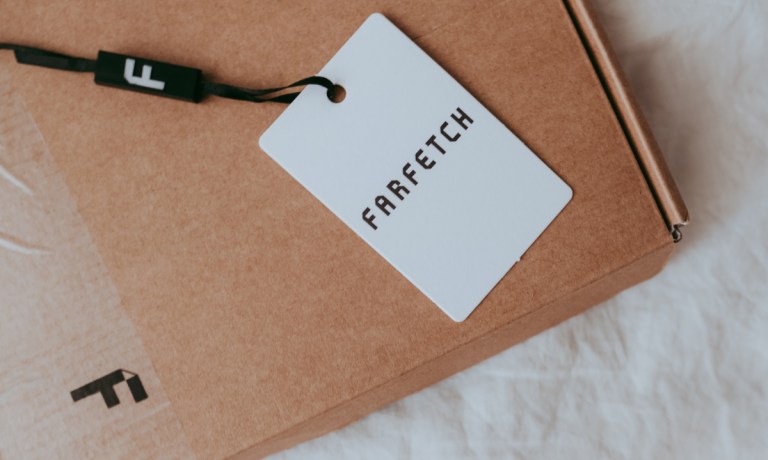AI Fuels Farfetch’s Return to Growth

After experiencing two consecutive quarters of sales decline, Farfetch has experienced a remarkable turnaround, as indicated by its first-quarter 2023 earnings report.
The online luxury retailer surpassed analysts’ projections by achieving 8% year-over-year (YoY) revenue growth. Encouraged by this momentum, the Farfetch is now placing significant emphasis on artificial intelligence (AI).
Several factors contributed to Farfetch’s recent growth. The company’s success can be attributed to an enhanced inventory management strategy, leading to increased sales. Strategic partnerships with brands such as Reebok played a role in boosting performance. Furthermore, Farfetch experienced strong in-store sales.
As part of its forward-looking strategy, the eCommerce platform announced a multifaceted approach which includes implementing cost-cutting measures, forging strategic partnerships, and establishing Farfetch as a trailblazer in the field of AI. CEO José Neves aims to drive the company’s success and solidify its position in the market.
“We’re developing three proofs of concepts, three prototypes, which I’ve seen already and made me very excited personally as a technologist,” Neves said on the call May 18. “It can’t be just a mechanical robotical conversation. It has to be an inspirational, engaging conversation. And even in the early different elements, we’re already seeing that and the way the models learn and get better very quickly, [it’s] quite impressive.”
While also making remarks about investments in AI during the company’s most recent earnings call, during an interview with WWD, Neves acknowledged the wider societal considerations surrounding artificial intelligence.
“Any technology is a double-edged sword,” Neves said. “And technologies can always be used for good or not.”
However, when it comes to fashion, he stated that the implementation of AI would be relatively uncomplicated compared to the ethical dilemmas encountered by broader search platforms.
“In terms of our industry in particular, fortunately it’s all about celebrating individuality, celebrating style, celebrating creativity,” Neves said. “And one of the things that is important in fine-tuning and training these models is really making sure that we’re focused on what we’re all about, which is discovering this amazing world of fashion globally. And bring that in an elevated and personalized way to customers and not really get into areas that in other businesses will be very problematic.”
Farfetch Bets on Investments
Neves said Farfetch avoids making investments for the mere sake of it. The company firmly believes that this approach is ineffective, not just in their own industry, but across all industries. The fashion industry, in particular, flourishes on the pillars of inspiration and discovery, serving the needs of discerning customers and sellers on their platform.
Building upon that sentiment, Neves disclosed that Farfetch has already integrated AI into their operations to enhance consumer connections. This includes leveraging AI for personalized recommendations, which has played a crucial role in converting potential shoppers into delighted buyers. The strategic use of AI has proven to be instrumental in improving customer satisfaction and driving successful transactions.
One such investment goes back to 2021, when Farfetch tapped Aurora Mobile Limited to bolster its intelligent operation functionalities.
Through the partnership, Aurora Mobile planned to use its AI-powered technology, smart operational analytics, and machine learning-based push notification solutions to support Farfetch in creating customized and intelligent retail experiences.
Read more: Farfetch Teams With Aurora Mobile On AI Retail Technology
“Three years ago, we’ve really recognized that personalization was a key strategic initiative for us and we increased the size of our machine-learning data science teams and really invested in the talent to build on this type of technology,” Neves said. “And it has really paid off. So we’ve seen our recommendation engine, which is built entirely in-house, our rank algorithm, which ranks the products on a one-to-one basis and personalizes it to the personalized communications.”
Farfetch by the Numbers
Farfetch finished out the quarter with a gross merchandise value (GMV) increase of 0.1% YoY, to $931.7 million. However, the digital platform GMV experienced a slight decline of 1% YoY, totaling $799.7 million. The company’s gross profit margin stood at 43.2%, representing a decrease of 160 basis points YoY, while the digital platform order contribution margin was 32.4%, reflecting a decrease of 30 basis points YoY. Farfetch reported a loss after tax of $174 million for the quarter, along with an adjusted EBITDA of $35 million.
Looking Ahead
According to Neves, 2023 is expected to be a pivotal year of execution for the company. With that, he noted that the progress of the deal to commence operations with Yoox Net-a-porter was on schedule.
See also: Luxury Industry Digitization Drives YOOX Net-a-Porter, Farfetch Partnership
He affirmed the company’s commitment to achieving its 2023 profitability and free cash flow objectives by pursuing cost-reduction and working capital initiatives, which are progressing smoothly.